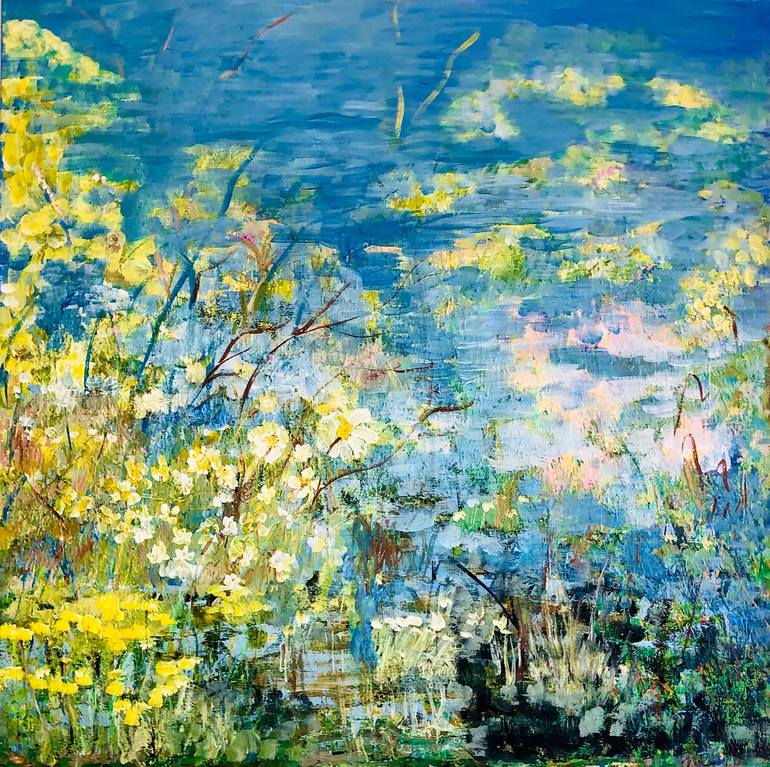


43 Views
2
View In My Room
Painting, Acrylic on Canvas
Size: 35 W x 35 H x 2 D in
Ships in a Crate
43 Views
2
Artist Recognition

Artist featured in a collection
ABOUT THE ARTWORK
DETAILS AND DIMENSIONS
SHIPPING AND RETURNS
Nature is the inspiration. Hope viewers find this painting joyful, uplifting, soothing. Painting in oil and acrylics on a large piece of canvas gives me energy and the feeling of free. Nature is forever the greatest inspiration and longing and celebrating the spring is what we need at the difficult ...
Year Created:
2023
Subject:
Styles:
Mediums:
Painting, Acrylic on Canvas
Rarity:
One-of-a-kind Artwork
Size:
35 W x 35 H x 2 D in
Ready to Hang:
Yes
Frame:
Not Framed
Authenticity:
Certificate is Included
Packaging:
Ships in a Crate
Delivery Cost:
Shipping is included in price.
Delivery Time:
Typically 5-7 business days for domestic shipments, 10-14 business days for international shipments.
Returns:
Free returns within 14 days of delivery. Visit our help section for more information.
Handling:
Ships in a wooden crate for additional protection of heavy or oversized artworks. Artists are responsible for packaging and adhering to Saatchi Art’s packaging guidelines.
Ships From:
United States.
Need more information?
Need more information?
Joanne Wang
United States
The Art of Joanne Wang by Alfred Corn Central to Chinese cultural tradition is the art of poetry. Painting was not at first regarded as an important and significant practice in China’s early history. When visual artists with serious ambitions began to appear, they sought to lend legitimacy to their paintings by including poems as part of the whole, inscribing classic texts in empty parts of the picture space. Meanwhile, writing itself moved from a mere convenience for conveying and preserving messages and texts toward a new form of visual art, what has come to be called “calligraphy.” The Greek origin of the word means “beautiful writing.” In Chinese it is called shu fa (书法) or “the method for writing”. It's a term which doesn’t suggest calligraphy’s artistic potential. Calligraphy as an art was pioneered and brought to special prominence during the Jin dynasty by Wang Xizhi (303–361). Joanne Wang has demonstrated that calligraphy is not a closed shop and that a woman artist can excel in it. The fluidity, spontaneity, vitality that is expected in good calligraphy is abundant in her work. Though she uses the same style of calligraphy as her ancestor, the xing shu (“walking” or “running”) script, it is inflected by her own artistic personality so that her calligraphy is not an exact duplicate of the work of any previous artist. Further, in keeping with the emphasis on scale in contemporary art, she has produced larger examples of calligraphy than we find among the classic calligraphers. Wang is also an ink painter and has produced new treatments of favored subjects in the Chinese tradition: bamboo, mountains, orchids and birds. But as an artist of the 21st century she has expanded her range to include photography, collage and abstraction. Recent influences on her work include the Belgian ink painter Henri Michaux, the “action” paintings of Jackson Pollock, and the Chinese Modernist painter Mu Xin. Mu Xin strove to incorporate modern Western aesthetic perspectives into the Chinese tradition, and Wang does the same. In particular, she has managed to revitalize Mu Xin’s techniques of using the random “behavior” of ink as it is spilled and pressed under glass as a point of departure for discovering design and figuration. This approach recalls Leonardo’s famous instruction to his students: before arriving at a subject and direction to take for your fresco, look at the cracks and irregularities in the wall where the fresco is to be painted.
Artist Recognition

Artist featured by Saatchi Art in a collection
Why Saatchi Art?
Thousands of
5-Star Reviews
We deliver world-class customer service to all of our art buyers.
Global Selection of Original Art
Explore an unparalleled artwork selection from around the world.
Satisfaction Guaranteed
Our 14-day satisfaction guarantee allows you to buy with confidence.
Support Emerging Artists
We pay our artists more on every sale than other galleries.
